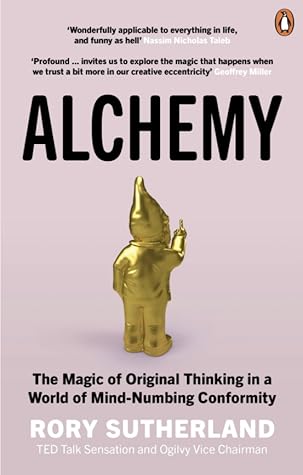More on this book
Community
Kindle Notes & Highlights
Read between
June 24, 2024 - February 6, 2025
It doesn’t pay to be logical if everyone else is being logical.
The need to appear scientific in our methodology may prevent us from considering other, less logical and more magical solutions, which can be cheap, fast-acting and effective. The mythical ‘butterfly effect’ does exist, but we don’t spend enough time butterfly hunting.
‘The trouble with market research is that people don’t think what they feel, they don’t say what they think, and they don’t do what they say.’
For a business to be truly customer-focused, it needs to ignore what people say. Instead it needs to concentrate on what people feel.
while we know how we feel, we cannot accurately explain why.
We are wrong about psychology to a far greater degree than we are about physics, so there is more scope for improvement. Also, we have a culture that prizes measuring things over understanding people, and hence is disproportionately weak at both seeking and recognising psychological answers.
Instincts are heritable, whereas reasons have to be taught; what is important is how you behave, not knowing why you do.
Metrics, and especially averages, encourage you to focus on the middle of a market, but innovation happens at the extremes.
Weird consumers drive more innovation than normal ones. By contrast, it is perfectly possible that conventional market research has, over the past fifty years, killed more good ideas than it has spawned, by obsessing with a false idea of representativeness.
In competitive markets, it pays to have (and to cultivate) eccentric tastes.
it doesn’t always pay to be logical if everyone else is also being logical. Logic may be a good way to defend and explain a decision, but it is not always a good way to reach one. This is because conventional logic is a straightforward mental process that is equally available to all and will therefore get you to the same place as everyone else. This isn’t always bad – when you are buying mass-produced goods, such as toasters, it generally pays to cultivate mainstream tastes. But when choosing things in scarce supplyfn7 it pays to be eccentric.
The more data you have, the easier it is to find support for some spurious, self-serving narrative. The profusion of data in future will not settle arguments: it will make them worse.
The ‘doorman fallacy’, as I call it, is what happens when your strategy becomes synonymous with cost-saving and efficiency; first you define a hotel doorman’s role as ‘opening the door’, then you replace his role with an automatic door-opening mechanism. The problem arises because opening the door is only the notional role of a doorman; his other, less definable sources of value lie in a multiplicity of other functions, in addition to door-opening: taxi-hailing, security, vagrant discouragement, customer recognition, as well as in signalling the status of the hotel. The doorman may actually
...more
If there is a mystery at the heart of this book, it is why psychology has been so peculiarly uninfluential in business and in policy-making when, whether done well or badly, it makes a spectacular difference.


